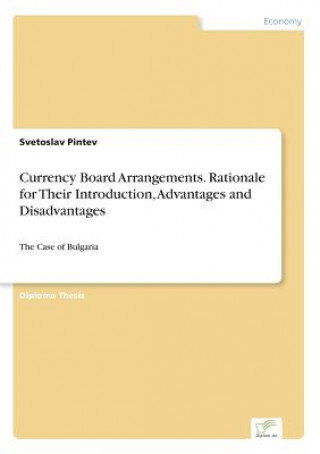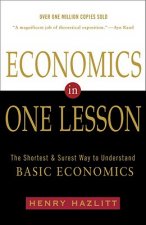
Kod: 02437457
Currency Board Arrangements. Rationale for Their Introduction, Advantages and Disadvantages
Autor Svetoslav Pintev
Diploma Thesis from the year 2002 in the subject Business economics - Trade and Distribution, grade: 1,5, Graduate Institute of International and Development Studies (unbekannt), language: English, abstract: Inhaltsangabe:Abstract ... więcej
- Język:
 Angielski
Angielski - Oprawa: Miękka
- Liczba stron: 84
Wydawca: Diplom.de, 2003
- Więcej informacji o książce

Zobacz książki o podobnej tematyce
Bon podarunkowy: Radość gwarantowana
- Podaruj bon o dowolnej wartości, a my się zajmiemy resztą.
- Bon podarunkowy dotyczy całej naszej oferty.
- Możesz wydrukować elektroniczny bon z e-maila a następnie przekazać go obdarowanemu.
- Ważność bonu wynosi 12 miesięcy od daty wystawienia.
Więcej informacji o Currency Board Arrangements. Rationale for Their Introduction, Advantages and Disadvantages
Za ten zakup dostaniesz 234 punkty
 Opis
Opis
Diploma Thesis from the year 2002 in the subject Business economics - Trade and Distribution, grade: 1,5, Graduate Institute of International and Development Studies (unbekannt), language: English, abstract: Inhaltsangabe:Abstract:§Currency board arrangements, under which domestic currency can be issued only to the extent that it is fully covered by the central bank s holdings of foreign exchange, were long generally dismissed as throwbacks to the colonial era. It was argued that such a rigid, rule-based arrangement was not well suited to diversified economies in many of which the authorities had developed sophisticated skills in monetary management. Instead, currency boards were seen as desirable in very small open economies (such as city-states for example). In 1960, 38 countries or territories were operating under a currency board. By 1970, they were 20 and, by the late 1980s, only 9.§In the last decade the interest for Currency Board Arrangement (hereinafter CBA) renewed because of its simplicity, transparency, and rule-bound character. It became evident after the successful efforts made by two transition economies-Estonia and Lithuania-which quickly managed to achieve credibility for their newly established currencies. In 1997, a currency board arrangement was introduced in Bulgaria to end the economic crisis. Soon after, Bosnia and Herzegovina followed. In 1998 there have been discussions on establishing a currency board arrangement in Russia. More recently the newly appointed Finance Minister of Poland initiated a debate on pegging the Polish zloty to the euro through a CBA.§This paper previews the history of the colonial and modern currency boards and presents the benefits of such a system for the newly emerged transition economies in Eastern Europe and Bulgaria especially. First, we will present a brief description of the currency board system.§Currency Board Arrangements after falling into oblivion during much of the post-war period, staged a remarkable comeback mainly in Central and Eastern Europe countries. Estonia, Lithuania, Bulgaria and Bosnia and Herzegovina have introduced this particular monetary framework and as a result have managed to break inflationary inertia, to bolster the credibility of the monetary authorities and to instill macroeconomic discipline. §Inhaltsverzeichnis:Table of Contents:§I.Introduction§1.What is a currency board?§2.What a currency board is not?§II.Origins of the Currency Board§1.Intellectual origin of the currency board system§2.Early Currency Board Systems§3.Decline of the Currency Board system. Reasons§4.Currency board system in nowadays§III.Currency Board system and Countries in transition§1.Factors determining the choice of monetary regime in Central and Eastern Europe§2.Recent currency boars-like systems in the countries in transition. Estonia, Lithuania, Bosnia and Herzegovina§3.Advantages and Disadvantages from a country in transition view, theoretical discussion§4.Performance. Empirical evidence§IV.The case of Bulgaria§1.Reasons for introduction of the currency-board system in Bulgaria. The collapse of the financial system§2.Structure and Practical Implementation§3.Analysis of the Macroeconomic framework before and after the establishment of a CBA in Bulgaria. The role of the CBA in Bulgaria`s after-crisis stabilization§4.The benefits of the Currency Board system in Bulgaria. A critical regard five years after§V.Conclusion§VI.Bibliography
 Szczegóły książki
Szczegóły książki
Kategoria Książki po angielsku Economics, finance, business & management Economics
404.22 zł
- Pełny tytuł: Currency Board Arrangements. Rationale for Their Introduction, Advantages and Disadvantages
- Podtytuł: The Case of Bulgaria
- Autor: Svetoslav Pintev
- Język:
 Angielski
Angielski - Oprawa: Miękka
- Liczba stron: 84
- EAN: 9783838665498
- ISBN: 383866549X
- ID: 02437457
- Wydawca: Diplom.de
- Waga: 122 g
- Wymiary: 210 × 148 × 5 mm
- Data wydania: 17. March 2003
Ulubione w innej kategorii
-

Principles for Dealing with the Changing World Order
93.91 zł -15 % -

Team Topologies
108.33 zł -6 % -

Freakonomics
36.85 zł -14 % -

Misbehaving - The Making of Behavioral Economics
48.93 zł -5 % -

Indispensable Milton Friedman
111.79 zł -11 % -

Little Book of Economics
47.71 zł -23 % -

Why Nations Fail
47.61 zł -14 % -

Pyramid Principle, The
191.19 zł -4 % -

Essential Mathematics for Economic Analysis
318.42 zł -7 % -

Economics In One Lesson
76.14 zł -13 % -

Predictably Irrational
67.11 zł -14 % -

Price of Inequality
48.93 zł -5 % -

(Mis)Behaviour of Markets
61.73 zł -23 % -

Debt, 10th Anniversary Edition
135.34 zł -12 % -

A-Level Economics: Year 1 & 2 Complete Revision & Practice (with Online Edition)
121.13 zł -10 % -

The Invisible Hand
33.90 zł -23 % -

Liar's Poker
61.42 zł -

Rational Optimist
47.61 zł -14 % -

Irrational Exuberance
89.14 zł -7 % -

Art of Statistics
52.79 zł -15 % -

Scrum - A Pocket Guide - 3rd edition
97.37 zł -5 % -

Hypomanic Edge
100.51 zł -3 % -

How I Made One Million Dollars Last Year Trading Commodities
203.17 zł -6 % -

Misbehavior of Markets
114.93 zł -

Econometric Analysis, Global Edition
367.16 zł -

Cartoon Introduction to Economics
79.90 zł -13 % -

Economics: The User's Guide
61.73 zł -23 % -

Rise of Carry: The Dangerous Consequences of Volatility Suppression and the New Financial Order of Decaying Growth and Recurring Crisis
132.70 zł -7 % -

Myth of Capitalism - Monopolies and the Death of Competition
111.79 zł -11 % -

How Rich Countries Got Rich and Why Poor Countries Stay Poor
70.97 zł -23 % -

Business Etiquette in Brief
63.86 zł -4 % -

Intermediate Microeconomics and Its Application
452.66 zł -

Discovery, Capitalism & Distributive Justice
95.54 zł -

Are the Rich Necessary?
54.01 zł -6 % -

Economic Point of View
115.44 zł -

Driving Digital Transformation
93.91 zł -23 % -

Start-Up Nation
43.75 zł -15 % -

Economic Facts and Fallacies
81.83 zł -10 % -

Decision Book
77.36 zł -7 % -

Necessary but Not Sufficient
86.30 zł -5 % -

Freakonomics
29.54 zł -15 % -

Economics Book
92.09 zł -14 % -

Leading at a Higher Level
131.28 zł -5 % -

Principles of Economics
77.36 zł -1 % -

Macroeconomics For Dummies
100.51 zł -11 % -

45 Second Presentation That Will Change Your Life
48.93 zł -6 % -

Economics of the Public Sector
356.29 zł -

Factfulness
52.59 zł -10 % -

Currency Wars
74.22 zł -11 %
zadowolonych klientów
Od roku 2008 obsłużyliśmy wielu miłośników książek, ale dla nas każdy był tym wyjątkowym.
Copyright! ©2008-24 libristo.pl Wszelkie prawa zastrzeżonePrywatnieCookies





 21 milionów książek
21 milionów książek Dostawa 10.99 zł
Dostawa 10.99 zł (32) 444 93 66 (8-15.30h)
(32) 444 93 66 (8-15.30h)